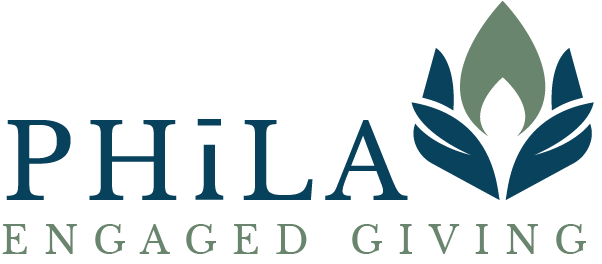by Selene Poulsen
During my time at the University of Washington, I wanted to expand my knowledge in new areas. Looking through the internships on my university’s job board, I saw the Phila Engaged Giving philanthropy internship posting and felt compelled to apply. I was concerned that being new to the philanthropy industry would limit my ability to contribute. Nevertheless, I soon found that my business skills and passion for community engagement complimented the job’s tasks. I felt privileged to have the opportunity and began absorbing as much as I could about consulting and philanthropy.
After a few weeks of working closely with my mentor, Stephanie Ellis-Smith, I saw numerous similarities between philanthropy and my life experiences. I reflected on my work in communities, connections with non-profit organizations, jobs I’ve had in the past, and my world travels. One part of my role with Phila has been to connect current events with philanthropy for content in our e-newsletter, Insights into the World of Philanthropy. With Ramadan approaching I was inspired to write about the correlations between the holiday and philanthropy.
In 2016, I took part in a study abroad program in Morocco. We traveled to six cities, participated in a three-day trek through the High Atlas Mountains, and experienced a hands-on approach in researching the impact of global warming, all while engaging with an Islamic country.
As the trip unfolded, I began to realize how westernized I was in my understanding of Islamic culture. Prior to this trip my knowledge on the subject was limited to what I saw from the U.S. news. I knew that women covered their hair and that their Bible was called the Quran. It was a shameful realization that I did not know more than these superficial bits of information.
Upon my arrival, I saw that people indeed did dress modestly. Not all women had their hair covered, however, as I originally assumed. In fact, many women were wearing shorts and a tank top. I quickly learned that Morocco is considered a liberal Islamic country compared to others. This, of course, varied as we traveled to more rural spaces. Like here in my home country, the rural places tended to have more conservative views, while the cities were the opposite.
I became immersed in Moroccan culture through its food, language, and history. We were fortunate to study Islam at the Al Akhawayn University in Ifrane. There we learned the entire history of Islam, including its origins, and how the culture has evolved into its modern-day components. When I reflect on my exploration of Ramadan, I now make meaningful connections to the philanthropy sector where I currently work.
Ramadan is observed by Muslims all over the world and was established in the 7th century when the Quran was revealed to Muhammad. It is based on a lunar calendar and therefore, does not start on the same day each year. This year it will begin at sundown on May 5th and will conclude on June 4th.
During this religious month, Muslims are expected to fast from sunup to sundown. When I learned about these dietary restrictions, I remember one student asking our guide, “but what if you’re pregnant?” I assume that most of us on the trip had never really practiced fasting other than the few Catholics who do mild fasting during Lent. I also was thinking “no food ALL day?” Our guide handled our ignorance with grace and answered our questions. He said, “pregnant women, young children, sick, or elderly are not expected to fast during Ramadan.” I was relieved to know that there were meaningful exceptions and then began to ponder, “why fasting?” It was at this point that I learned about the beautiful meaning of Ramadan.
During the month of Ramadan, not only do Muslims fast, but they are expected to stop all behavior that may be considered immoral. This may include smoking, drinking, and sexual activity--depending on how strictly you practice. Additionally, they are supposed to avoid having impure thoughts or using unclean words. These actions are meant to cleanse the soul of impurities, as well as empathize with the poor and hungry.
Although philanthropy can be found in many religions, what is interesting about Islam is that Zakat (alms giving) is the third pillar of the five that the religion is founded on. The meaning of giving is a crucial foundation of Islam. To practice Zakat means that if you make enough, an annual payment of 2.5 percent of your wealth will be given to the poor. Zakat is an important religious component of Ramadan. If one cannot fast during Ramadan, they are expected to practice Zakat and give food to the poor regularly. In fact, during Ramadan, every Muslim is expected to give to the poor more frequently.
Another aspect of Ramadan is self-reflection. Muslims are expected to practice self-reflection more frequently during Ramadan, including visiting mosques more regularly for prayer. During the holiday, they practice special prayers and some Muslims take this time to read the Quran in its entirety.
After learning about this, I began to think about when I take the time to do this in-depth reflection and self-care. I began to understand the importance of Ramadan in which people are encouraged to get outside of themselves and their busy lives. The truth of the matter is that I really don’t do this often. I volunteer regularly. I fight for equality. I maintain to do what I believe is right daily. But on a spiritual level, I have not done anything as meaningful as Ramadan’s annual teachings.
It is for all these reasons that I encourage you to please take some time during the month of May to learn more about Islam, Ramadan, and philanthropy. Discover how these three components are intertwined. There is always a way to connect by exploring our differences. You may be pleasantly surprised with what you find out and how the lessons can apply to your daily life. I know I was.

